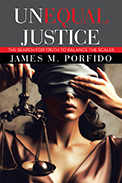
 |
Porfido, both a successful public prosecutor and private defender with thirty-five years of service in New Jersey, renders his verdict: the criminal justice system is broken. Trials consume too much time and taxpayers’ money. Courts are overcrowded and constipated. Pre-trial incarceration periods are so lengthy that defendants jump at unfair plea bargains (a cost saver for the state) just to get out of jail. Justice delayed becomes justice denied until the defendant runs out of money.
When his career was stymied as the county’s chief prosecutor of sex crimes, child abuse, and vehicular homicide, the author made the leap to private practice. He soon knew that “unequal justice would be the spotlight of this transition from the prosecution table to the defense table.” Now a defense attorney, he shares that the act of engaging private (paid) counsel prejudices a jury. “Proof beyond a reasonable doubt” becomes a loose term when courts “expanded the strike zone for the prosecutor.” Something called “consensual overhear” makes “I’m sorry” an admission of guilt. During COVID, E-courts and Zoom courts added layers of technological inequity. Recent soft-on-crime approaches and bail reform allow violations of the law to be ignored and, unfortunately, weaken the system and the public’s trust. Convolution upon convolution warps and inverts the legal system.
Porfido presents case studies as both a prosecutor and a defender in layman-friendly terms to illustrate the legal system’s complexities and abuses. With a humble, funny, but dead-serious narrative style, the author’s war stories demonstrate acuity with engaging chapter titles, such as “Too Drunk to Shoot,” “The Babysitters from Hell,” and “The Whizzinator.” This insider’s honest point of view on criminal justice seeks to expose problems in the system, open eyes, and begin a discussion that leads to change. Porfido proves beyond reasonable doubt that “The consequences of unequal justice reverberate throughout society.”